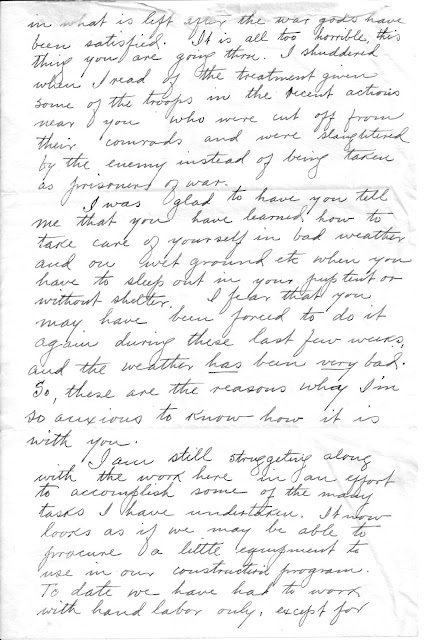Marilu- I am posting this a little late, on January 21st 2020 which as it happens is Grandpa Luther Murkins Winsor's birthday. He would be 136 today...He was still in Iran at this time working on water and irrigation.
January 18 1944 (The context of this letter makes me sure that Lu's dad automatically wrote 1944 when it was actually 1945. Who of us hasn't done that?-Marilu)
My Dearest Son Luther,
I am away from headquarters and therefore have no means of knowing whether or not there is any further word from you. The last I had was written Dec. 6, post marked Dec. 9, so you may know how anxious I am about your welfare. You have been in a "hot spot" these last few weeks. Of course I don't know just where you are, but ----------
God grant that you are safe, and that you and your companions will soon be relieved from the terrible ordeals of war on the fighting front. You will never in this life be entirely relieved from the effects of war, even tho you escape without bodily injury, for the after effects will continue for many many years. However, there are many things to which you can look forward with pleasure and you and your children can make your way somehow-and find your places
I was glad to have you tell me that you have learned how to take care of yourself in bad weather and on wet ground, etc. when you have to sleep out in your pup tent or without shelter. I fear that you may have been forced to do it again during these last few weeks and the weather has been very bad. So, these are the reasons why I'm so anxious to know how it is with you.
I am still struggling along with the work here in an effort to accomplish some of the many tasks I have undertaken. It now looks as if we may be able to procure a little equipment to use in our construction program. To date we have had to work with hand labor only, except for
limited help from the U.S. Army. We are just finishing an irrigation project with a 5 1/2 kilometer tunnel, and 30 kilometers of canal and laterals. Quite a job to tackle with shovels. We are also completing a 27 kilometer pipe line, with 5 kilometers of underground channels where fresh water was developed for one of the largest sea ports that was without water to drink on dry years like two since I have been here. We hauled water in tankers for domestic use last summer. They had depended upon rain, and it did not rain, so many people actually suffered for water to drink. Now, after more than 2,000 years, they will have a permanent supply, delivered to all parts of the city.
I am down here now with a special commission to plan a big development program in the S.W. near the ancient city of Shiloh-where the prophet Daniel was buried and where Queen Esther had her castle. There is the ruins of an ancient dam about 1,000 meters long across the largest river in this country, that we are planning to repair and put water out for an area 52 kilometers long & 15 kilometers wide.
This will revive the ancient capitol of Media, and a series of settlements that have dwindled to villages for lack of water. We are here at the personal request of the Prime Minister who called me 3 days in succession just before I left and spent 2 hours with me each day discussing all the problems with which I have been struggling, and giving me assurance of support in those important undertakings that mean so much to the future of this country.
This is why I just have to stay on a little longer. But I promise that I shall go home with you or at the same time, if not before. So my boy, we must keep our chins up, and not let down, even for a minute, and look forward to the wonderful time when we can be at home together and with those we love more than life itself.
God bless you and keep you safe is my constant prayer-
Your loving father,
L. M. Winsor




Comments
Post a Comment